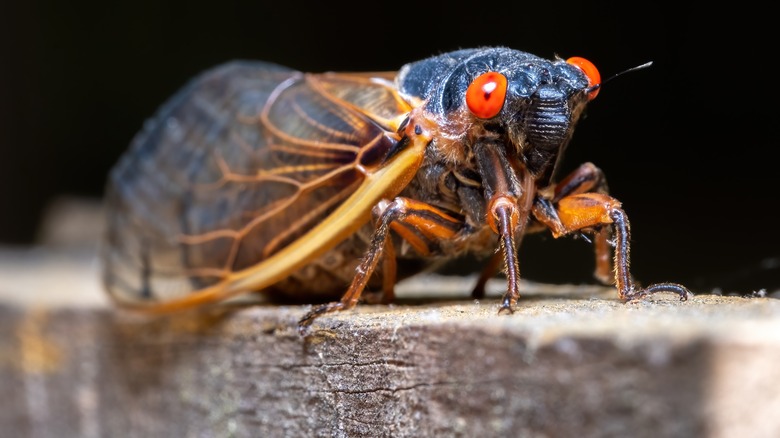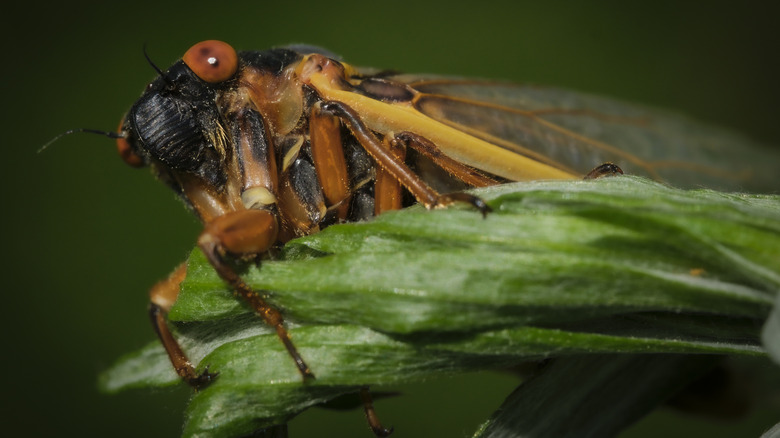The Nightmare-Fueling Reason You May Want To Avoid A Trip To Chicago This Summer
There are so many reasons to adore Chicago: glittering skyscrapers that tower over Lake Michigan, creating one of the most impressive skylines in human history; sporting events so electrifying they make even the least-enthusiastic fans jump out of their seats. The city is also home to one of the best beaches in America and much more. But before you plan your trip to Chicago (aka, the Windy City) this summer, hold on a second. Something is happening there that has people (except die-hard entomologists) running for the hills.
It's the once-in-a-lifetime phenomenon of cicada convergence. Cicadas are cockroach-sized insects that seem to have escaped from a horror movie. They have wide bodies, bulbous red eyes, and filmy wings, and males have abdominal membranes that vibrate, emitting creepy, extremely loud chirping noises. In addition, a subgroup known as periodical cicadas (found only in the central and eastern parts of the U.S.) have the mystifying ability to go underground for over a decade, where they munch on tree roots. They then suddenly reemerge to feast on woody plants and engage in frenzied reproduction. This year, cicadas with two different lifecycles — 13 and 17 years — are appearing in the same period throughout Illinois. This is what's known as a "double-brood emergence" event, which hasn't occurred for 221 years. What this means is that in early summer 2024, the Chicagoland area could be covered in a terrifying, vibrating, whirring carpet of insects.
Cicada emergence across Illinois
As of late May 2024, the periodical cicadas have already been sighted all over Illinois, with the highest number of reports coming from Chicago and the northern part of the state. Residents report seeing them crawling around trees and scattered on the ground, and more are expected — billions or trillions of them in total. Juvenile insects leave their underground homes after rainfall and when the soil temperature at a depth of about 8 inches reaches about 64 degrees. They are emerging at different times across Chicago and Illinois because of minor differences in air temperature, humidity, and topography in these areas, all of which can affect soil temperatures.
@chimovietours It's official: the 2024 class of cicadas is in the house. 😱🤢 #chicago #chicagotok #chicagotiktok #chimovietours #cicadas
So far, Chicagoland residents' reactions to the spectacle are mixed, with some adults noting that their children are delighted to have discovered new playmates. "It's just another activity for the kids to play with. So, they're catching them and putting them in their little container, and walking around in the backyard and then releasing them again," Chicago suburbanite Nikki Allen told ABC 7 Chicago. The same article reported that these sentiments were not necessarily shared by teens, one of whom expressed, "I feel like I'm crunching with every step." Offering yet another perspective, chef Joseph Yoon sees enormous culinary opportunities in this year's doubly crunchy brood, explaining to NPR that "they have this really beautiful vegetal quality and a nutty quality as well." We're wondering if he runs one of the weirdest restaurants in the world!
What to expect during the cicada emergence
So what does this all mean for travelers? Unless you have a craving for spicy popcorn cicadas (yummy!), it might be best to postpone visiting while the macabre event is underway. This includes visits to not only double-emergence hotspots throughout Illinois, but also other areas of the U.S. where single broods are emerging in droves: parts of Iowa, Missouri, Arkansas, and a smattering of southeastern states as well. The good news is that the giant bug party should wind down by the end of June, so it should be safe for the insect-averse to visit these places from July onwards.
If you are undaunted by the prospect of cicadas en masse and you plan to visit Chicago in June, here's what you can expect. Besides the crunchy streets alluded to earlier, you can also anticipate a substantial ruckus arising from the male cicadas calling to potential mates, creating a noise level similar to that of a rock concert or nearby jet. "What happens is when you have this many cicadas ... all together in one place, then it can be deafening," said cicada expert Catherine Dana to NBC Chicago. Fortunately, the frenzy tends to die down at night, providing a welcome respite for any nearby humans and allowing them to sleep. For more tips on steering clear of creepy crawlies on your next summer vacation, check out our guide on the top vacation destinations that become bug-infested every summer.


